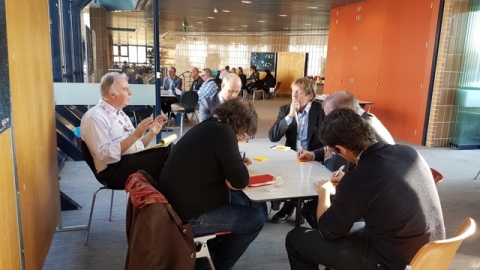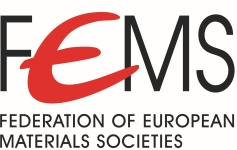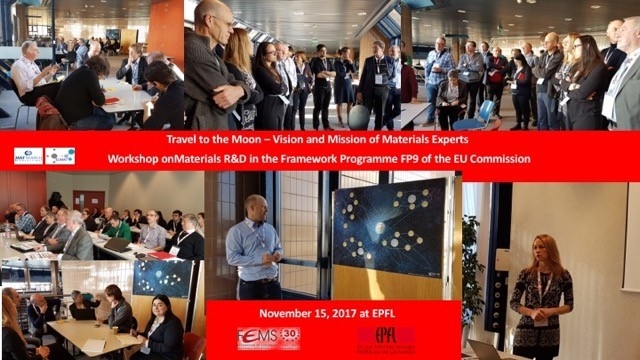FEMS Workshop on Materials R&D in the Future Framework Programme FP9 of the EU Commission

The experts started by discussing the societal challenges, especially four of them Health, Demographic Change and Well-being, Food and water security, Smart, Green and Integrated Transport, Secure Society. These topics included Transformation to a Sustainable Society/Europe in a Changing World, Environment, Resource Efficiency and Secure Clean Energy as well.
The experts depicted the role that the choice of materials (raw materials), the materials development, manufacturing the recycling and re-use can play to follow a sustainable approach in a future materials mission in Europe. Having the idea of using the galaxy, Bernie Rickinson, Chief Executive of IOM3 and member of the Executive Committee of FEMS FEMS guided the four focus groups through their mission. In the galaxy, the earth acted as one of the “societal challenges”, having four planets as the main topics in these challenges. The five planets acted as the important subgroups, so that the “travel to the moon” could start with all kinds of expert visions for solving the societal challenges.
In a second step the workshop participants shared their understanding about those materials and processing processes which would be important in order to fulfil these visions and to become a materials mission. These topics were each accompanied by questions on how to avoid critical materials, how to align the design to the demands of recycling, and how to produce as environmentally friendly and CO2 neutral as possible. The focus groups were also joined by PhD students and Postdocs from EPFL who gave their input from the view of the future generation which has to deal with the challenges.
GROUP 1: Health, Demographic Change and Well being; Chair: Heinrich Hofmann; Silvia Pascale
GROUP 2: Food and water security, Chair: Rudy Koopmans, Margarethe Hofmann
GROUP 3: Smart, Green and Integrated Transport; Chair: Winfried Keiper, Jose Cubillo
GROUP 4: Secure Society Chair: Bernie Rickinson, Roland Gauss
Materials know-how for advanced and smart materials with more and more complexity and functions using a long catalogue of elements – today some of them are highly critical – has been built up during all existing framework programmes responding to the needs for industrial innovations and of consumers and citizens. Today we will use this know-how but will combine it with the request of our citizens and politicians to address Europe’s societal challenges. Therefore, mainly materials and manufacturing methods should be developed which offer better environmental friendly conditions (CO2 neutral), leading to easier recycling and re-use of valuable and necessary materials within Europe and at the same time enables industry to profit from the complexity of functions that the materials have.
The workshop also discussed the topic of Expert Groups, which was one of the main topics in the MATCH Project, that the Alliance for Materials (A4M) has initiated and in which FEMS and EuMaT were important partners. Based on two workshops, initiated during the MATCH project by FEMS and organised by FEMS Past President Margarethe Hofmann and KMN-VIN’s Secretary Michal Basista (European Virtual Institute on Knowledge-based Multifunctional Materials AISB), a discussion at the EuMaT Board meeting on October 5, 2017 was held. Winfried Keiper and Amaya Igartua developed the proposal from this meeting further and showed it at the workshop in Lausanne. It was recommended by the workshop experts to better combine the proposed the working groups of EuMaT with the societal challenges and to have in mind that the outcome of working groups as cross cutting activities should be foreseen for industrial sectors like proposed in the MATCH project (Transport, Energy, Construction, Health, Creative Industries) but also for further industrial sectors as the global needs are important for each of these sectors. Having again in mind the new FP9 Materials Mission, this group of experts would be extremely interesting in future to accompany the mission. FEMS as federation of 28 national societies in Europe and more than 20’000 professionals will further support these activities and help with information and by dissemination in the various countries.
A short report is downloadable below.
For further information on the Workshop Outputs please download the Discussion Document below (password protected, restricted to delegates).


